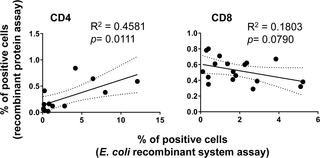PLOS Neglected Tropical Diseases ( IF 3.8 ) Pub Date : 2017-09-05 , DOI: 10.1371/journal.pntd.0005912 Rosângela Salerno-Gonçalves , Hervé Tettelin , David Lou , Stephanie Steiner , Tasmia Rezwanul , Qin Guo , William D. Picking , Vishvanath Nene , Marcelo B. Sztein

|
Salmonella enterica serovar Typhi (S. Typhi), the causative agent of the typhoid fever, is a pathogen of great public health importance. Typhoid vaccines have the potential to be cost-effective measures towards combating this disease, yet the antigens triggering host protective immune responses are largely unknown. Given the key role of cellular-mediated immunity in S. Typhi protection, it is crucial to identify S. Typhi proteins involved in T-cell responses. Here, cells from individuals immunized with Ty21a typhoid vaccine were collected before and after immunization and used as effectors. We also used an innovative antigen expressing system based on the infection of B-cells with recombinant Escherichia coli (E. coli) expressing one of four S. Typhi gene products (i.e., SifA, OmpC, FliC, GroEL) as targets. Using flow cytometry, we found that the pattern of response to specific S. Typhi proteins was variable. Some individuals responded to all four proteins while others responded to only one or two proteins. We next evaluated whether T-cells responding to recombinant E. coli also possess the ability to respond to purified proteins. We observed that CD4+ cell responses, but not CD8+ cell responses, to recombinant E. coli were significantly associated with the responses to purified proteins. Thus, our results demonstrate the feasibility of using an E. coli expressing system to uncover the antigen specificity of T-cells and highlight its applicability to vaccine studies. These results also emphasize the importance of selecting the stimuli appropriately when evaluating CD4+ and CD8+ cell responses.
中文翻译:

新型抗原表达系统用于研究沙门氏菌血清型鼠伤寒沙门氏菌T细胞对蛋白质的识别
沙门氏菌血清型伤寒(小号,伤寒沙门菌),伤寒的病原体,具有重大的公共卫生重要性的病原体。伤寒疫苗可能是对抗这种疾病的一种经济有效的措施,但是触发宿主保护性免疫应答的抗原却鲜为人知。鉴于细胞介导的免疫在S中的关键作用。伤寒保护,识别S至关重要。伤寒蛋白参与T细胞反应。在此,在免疫之前和之后收集来自用Ty21a伤寒疫苗免疫的个体的细胞,并将其用作效应子。我们还使用了一种创新的抗原表达系统,该系统基于重组大肠杆菌感染B细胞(Ë。大肠杆菌)中表达4中的一个小号。以Typhi基因产物(即SifA,OmpC,FliC,GroEL)为靶标。使用流式细胞仪,我们发现对特定S的反应模式。伤寒蛋白是可变的。有些人对所有四种蛋白质都做出了反应,而另一些人只对一种或两种蛋白质做出了反应。接下来,我们评估了T细胞是否对重组E产生反应。大肠杆菌还具有对纯化蛋白作出反应的能力。我们观察到CD4 +细胞对重组E的反应,而不是CD8 +细胞对重组E的反应。大肠杆菌与纯化蛋白的反应显着相关。因此,我们的结果证明了使用E的可行性。大肠杆菌表达系统,以揭示T细胞的抗原特异性并突出其在疫苗研究中的适用性。评估CD4时,这些结果还强调适当地选择刺激的重要性+和CD8 +细胞的反应。


























 京公网安备 11010802027423号
京公网安备 11010802027423号